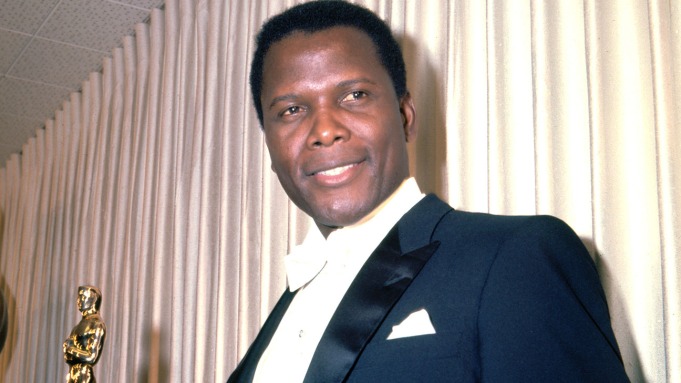The moment might as well be called ‘the slap’ for its epic import. In 1967’s In the Heat of the Night, murder suspect Endicott (Larry Gates) slaps Detective Virgil Tibbs (Sidney Poitier), a Black man. Without hesitation, Tibbs slaps him right back — a solid backhand connection at that. Poitier’s reaction reverberated across not only Civil Rights-era America, but around the world. None other than Nelson Mandela, according to People magazine, felt the impact of the avenging anger contained in that hand.
Poitier passed away at his Los Angeles home on Thursday, January 6 at the age of 94. From the time of his first major role as a 16-year-old in 1955’s The Blackboard Jungle, the man was not only an incredible actor but a trailblazing Black man. For better or for worse, actors are impactful public figures. No actor, though, may have had more of an impact on American culture than Poitier. Poitier’s transcendence of racial stereotypes on the stage, in film, and as an activist not only changed an entire society’s view of Black people, but kicked down barriers, and opened entirely new vistas for people of color.

“I’m part of this legacy. I, Wesley Morris, Negro sitting at The New York Times — I’m not possible without Sidney Poitier,” Morris said on The Daily.
Poitier, born in Miami, raised in the Bahamas, and schooled at the American Negro Theatre in New York City, exuded a magnetic mix of charisma, charm, and polished good looks. Poitier’s grace and talent were undeniable and he used that platform to make demands that fueled the Civil Rights era. In 1963, Poitier was the first Black man and first Bahamian to win the Academy Award for Best Actor for his work in 1963’s Lilies of the Field. His acting career peaked with three 1967 films that addressed issues of race and race relations in the United States.
In To Sir, with Love, Poitier played a British Guianaian who accepts a teaching post at North Quay Secondary School in the tough East End of London. Based on an autobiographical novel of the same name, the film deals with social and racial issues in inner-city schools.
In Guess Who’s Coming to Dinner, Poitier played a Black doctor in a relationship with a White woman — actress Katharine Houghton. Set in liberal San Francisco, the woman’s parents, played by Katharine Hepburn and Spencer Tracy, are still shocked by the match. The movie remains a rarity, depicting interracial marriage in a positive light. At the time, interracial marriage, in fact, was still illegal in 17 states.
In the Heat of the Night was possibly Poitier’s greatest critical and financial success with the film taking home the Academy Award for Best Picture. A mystery drama directed by Norman Jewison, Poitier played Virgil Tibbs, a Philadelphia police detective who investigates a murder in Deep South Mississippi alongside Gillespie, a racially-prejudiced cop played by Rod Steiger. Along with the slap, the film contains several indelible moments of racial reckoning.
“That’s a funny name for a n***** boy that comes from Philadelphia! What do they call you up there?” Gillespie asks upon meeting Poitier’s character.
“They call me Mister Tibbs!” Poitier responds.
Related Guides
Poitier put his money behind Black revolutionary causes in this country and throughout the world. At his own peril and with his own money, Poitier supported and marched with the Civil Rights movement in the 1960s, and, in the 1980s, the anti-apartheid movement. For decades, actor and singer Harry Belafonte was there with him.
”For over 80 years, Sidney and I laughed, cried, and made as much mischief as we could. He was truly my brother and partner in trying to make this world a little better. He certainly made mine a whole lot better,” Belafonte said in a statement.
Over 30 years after Poitier became the first Black man to win an Oscar for best actor, Denzel Washington became the second for his performance in 2001’s Training Day.
In his victory speech, Washington saluted Poitier, stating “I’ll always be chasing you, Sidney. I’ll always be following in your footsteps. There’s nothing I would rather do, sir.”
In 2009, then-President Barack Obama awarded Poitier the Presidential Medal of Freedom for his work and achievements.
“Through his groundbreaking roles and singular talent, Sidney Poitier epitomized dignity and grace, revealing the power of movies to bring us closer together. He also opened doors for a generation of actors,” President Obama tweeted.
Through his groundbreaking roles and singular talent, Sidney Poitier epitomized dignity and grace, revealing the power of movies to bring us closer together. He also opened doors for a generation of actors. Michelle and I send our love to his family and legion of fans. pic.twitter.com/zkYKFSxfKA
— Barack Obama (@BarackObama) January 7, 2022
For Morris, reporting on The Daily, this influence transcended Hollywood to the lives of all people in this country.
“Poitier affected the life of every Black person in this country. Poitier affected the life of every White person in this country. There may not have been a more important cultural figure than Poitier,” Morris said.
That is one hell of a life to live and legacy to leave behind.



